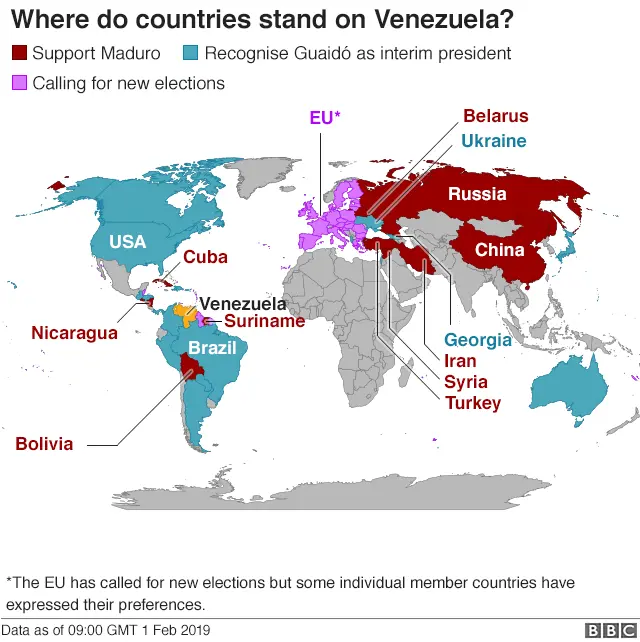Venezuela crisis: Why Russia has so much to lose
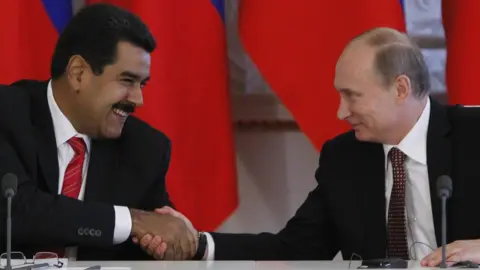 Getty Images
Getty ImagesAs the political and economic pressure on Nicolás Maduro mounts, Venezuela's president believes there is one person he can rely on - Vladimir Putin.
The Kremlin has accused the opposition leader Juan Guaidó of an "illegal attempt to seize power", backed by the United States. Moscow says it will do "everything required" to support Nicolás Maduro as Venezuela's "legitimate president".
But Russia's appetite for protecting relations with Caracas may be more limited than its rhetoric suggests.
Years of close alliance
Moscow has long been a key ally of President Maduro, and Hugo Chávez before him - as fierce critics of Washington, right in America's backyard.
"The relationship is symbolically important. It's about saying 'we're not alone, there are others who are very critical of the US and Western policy'," explains Andrei Kortunov of the Russian International Affairs Council.
That's partly why Moscow has expanded co-operation with Caracas in recent years - increasing arms sales, extending credit and even flying in two bombers last December in a show of support.
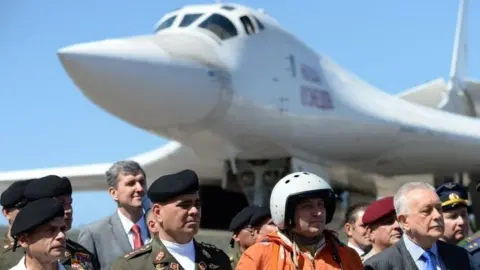 AFP
AFPIts backing for Nicolás Maduro in the current crisis is also fuelled by a horror of popular uprisings, particularly those supported openly by the West.
More on the Venezuela crisis:
"Unpopular social policies, an impoverished population and economic crisis - against a background of battling the whole world and corrupt… politicians. Guess which country this refers to?" independent newspaper Novaya Gazeta wondered this week.
It was drawing the parallels with Russia that it believes the Kremlin sees - and fears - in Caracas.
Moscow also has money at stake. It has sunk significant amounts into backing Nicolás Maduro, much of that in loans it stands to lose if he is forced from office.
The full extent of Russia's exposure isn't clear.
Analysts talk of $17bn (£13bn), mostly dished out in credit to the Maduro government. But Kremlin spokesman Dmitry Peskov declined to put a figure on it when questioned by journalists earlier this week.
He was even more tight-lipped on whether Russia worried about losing that investment. "I won't respond to that," Mr Peskov said.
Then there's the oil
Venezuela sits on the largest proven oil reserves in the world.
"When we sent weapons, no-one thought of collecting the debt. What was really in mind, I think, was access to the oil wells, to production," argues Carnegie Centre economist Andrei Movchan.
Russia's state-owned firm, Rosneft, now has stakes in multiple projects in Venezuela and has issued significant loans to the country's oil giant, PDVSA.
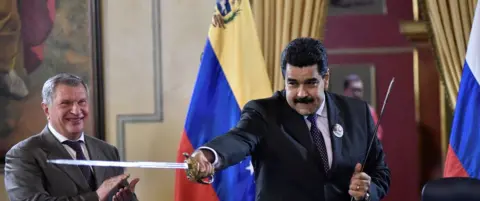 Getty Images
Getty Images"Venezuela was in a bad shape, so it was easy to agree terms," Mr Movchan says.
'A black hole for Russia'
But whilst state television programmes here have been blasting headlines, slamming the US "intervening in the affairs of a sovereign state", others have been questioning the wisdom of Russia's own Venezuela policy.
"Venezuela is a black hole for Russia, where billions of dollars have been sunk… and the effect is zero," analyst Mikhail Krutikin told Kommersant newspaper. He talked of "utter incompetence and squandering."
"It's a very unfortunate situation," Andrei Kortunov says. "We knew this was coming, so I wonder what the fall-back position is of those who invested there, but I don't see it."
Russia is now advocating political negotiations in Venezuela, with international mediation. It presents the opposition, and the US, as intransigent for continuing to call for fresh elections.
What is Moscow doing?
Meanwhile, with no sign of imminent mass defection by the military, reports have emerged suggesting Moscow may be upping its support for Nicolás Maduro.
As fresh US sanctions were imposed on Caracas this week, Novaya Gazeta suggested that Russia had helped fly Venezuelan gold from storage in the Russian Central Bank for sale in Dubai.
The paper's sources claimed over $1bn in cash was then taken on to Caracas. The Central Bank chairwoman said that did not "correspond to reality".
There have also been reports that Moscow has deployed private military contractors, possibly as protection for President Maduro.
The Kremlin has rebutted that, too, though Mr Maduro himself was simply evasive. "I'm not making any comment," he told Russian reporters this week.
How far will it go?
The foreign ministry pledge to do "everything" to back Nicolás Maduro does seem to have limits.
"I don't think Russia would defend Maduro militarily. We are for a political settlement," argues retired Lieutenant-General Evgeny Buzhinsky. He describes those bombers sent to Caracas last year as simply "symbolic".
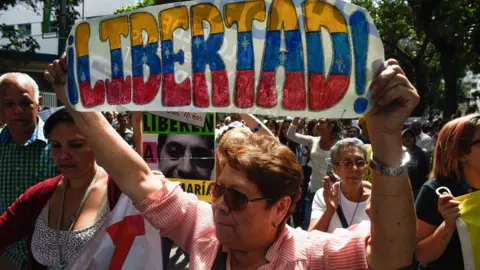 AFP
AFP"It would be madness for Russia to try to intervene with force," Andrei Movchan agrees. "Venezuela is not Syria. The Chinese are there and the Americans are much closer."
At least in public, Russia has settled for condemning US pressure, calling for dialogue - and waiting. Perhaps it is hoping its ally can weather the storm.
As one tabloid newspaper here argued, opposition rallies on Wednesday were smaller than expected.
"They held the decisive protest - and then they called the next one," Komsomolskaya Pravda joked, suggesting "something went wrong".
Another paper, though, is convinced President Maduro's days in office are numbered, suggesting the Kremlin should simply offer "its friend" political asylum.
"The long, cold Moscow winter is not ideal of course for Maduro, used to palm trees and a year-round average of 25C," Moskovsky Komsomolets reasoned.
"But it's still better than a warm prison cell in Caracas."
